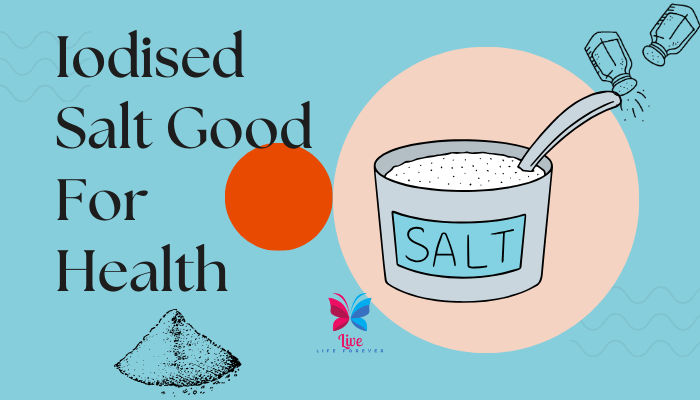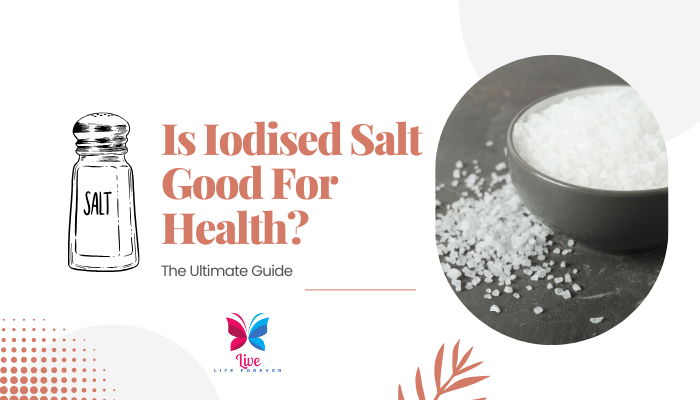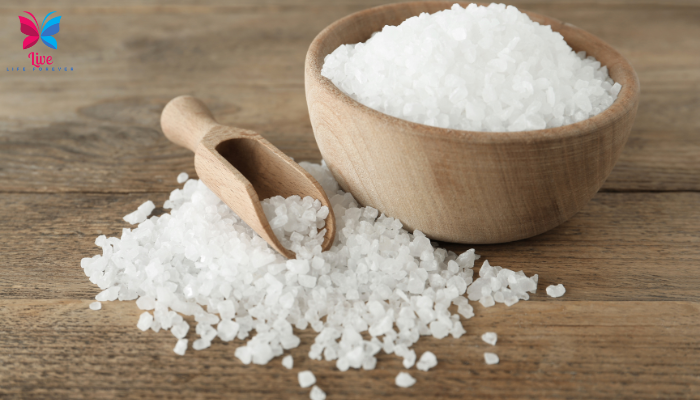Is Iodised Salt Good For Health?

Is Iodised Salt Good For Health?

Iodised Salt Good For Health
Salt is an essential part of the human diet, but too much sodium can lead to high blood pressure and other health issues. Iodised salt contains added iodine, an important nutrient that supports thyroid health and function. But is iodised salt actually good for you? This comprehensive article explores the pros and cons of iodised salt good for health.
What is Iodised Salt?
Table salt typically contains 40% sodium and 60% chloride. Iodised salt starts with this same base, but also contains added potassium iodide, a stable source of iodine. According to the Centers for Disease Control and Prevention (CDC), approximately 70% of household salt sold in the United States is iodised.
The Benefits of Iodine and Iodised Salt
Here is an overview of the evidenced-based health benefits associated with adequate iodine intake from iodised salt:
Supports Thyroid Health
The thyroid requires iodine to produce key hormones triiodothyronine (T3) and thyroxine (T4) which regulate metabolism. Consuming adequate iodine prevents hypothyroidism, associated with fatigue, weight gain and sensitivity to temperature changes when the thyroid underperforms. Getting sufficient iodine also reduces risk for Hyperthyroidism, featuring accelerated heart rate, tremors, heart palpitations and more resulting from thyroid overactivity.
In Pregnant Women, Supports Fetal Neurological Development Pregnant and breastfeeding women have increased iodine needs, requiring nearly double the adult recommendations at 290 micrograms daily per the World Health Organization (WHO). Adequate intake prevents neurological and developmental issues in babies by enabling production of thyroid hormones crucial for healthy growth and maturation.
May Support Cognitive Function
Emerging research demonstrates iodine sufficiency associates with enhanced cognitive abilities across all life stages. An observational Chinese study found school-aged children in iodine sufficient regions demonstrated better IQ test performance than their peers in iodine deficient areas. Sufficient iodine intake supports optimal neurological growth and activity.
Provides Nutrient Stability
Table salt itself is highly shelf-stable, lasting indefinitely without spoilage issues. By adding potassium iodide to salt, this ensures a steady, reliable source of absorbable iodine in the food supply. Iodine readily leaches from salt solutions and evaporates in storage, so fortifying salt enables nutritional stability.
Promotes Population Level
Thyroid Health Insufficient dietary iodine proves uncomfortably common, even in developed countries. Fortifying widely used table salt serves as an efficient public health strategy towards combating deficiency across large populations. Universal iodised salt consumption helps normalize thyroid function.
Associated with Lower Incidence of Goiter
Goiter describes enlargement of the thyroid gland triggered by inadequate production of T3 and T4 thyroid hormones stemming from severe, chronic iodine deficiency. Regular consumption of properly iodised salt nearly eliminates new cases of goiter according to WHO reports. Supported thyroid function via salt iodisation prevents disfiguring goiters.
Recommended by Major Health Organizations
The Center for Disease Control (CDC), World Health Organization (WHO), Academy of Nutrition and Dietetics and other noteworthy health authorities endorse and recommend consuming adequately iodized salt as a safe public health intervention for improved nutrition. Iodised salt proves a cost-effective, efficient strategy with proven benefits.
Potential Drawbacks of Iodised Salt
Despite the above benefits, iodisation of edible salt also carries some potential risks require awareness including:
Excess Iodine Triggers Adverse Effects
While mild deficiency proves most commonplace, consuming excess iodine also causes complications. Surfeit iodine intake temporarily inhibits thyroid hormone production and can worsen acne, rashes and autoimmune thyroid disorders like Grave’s disease. Sensitivities sometimes emerge around iodine in salt. Monitoring intake prevents toxicity.
Promotes Excess Sodium
Intake Encouraging increased salt intake to boost iodine risks elevating sodium above recommendations as most consume double suggested limits. This potentially raises blood pressure and cardiovascular disease risk. While iodine proves beneficial, excessive sodium intake contributes to kidney disease, stroke and heart attack in sodium-sensitive individuals.
Can Contain Trace Heavy Metals Like Cadmium
While rare, certain trace heavy metals like cadmium sometimes contaminate food grade salt supplies during harvesting, processing, transport or storage. Other pollutants also sporadically taint batches. While minute, exposure bioaccumulates over years increasing toxicity risks. Supply chain auditing minimizes likelihood of contamination.
May Mask Underlying Thyroid Dysfunction
Boosting low thyroid hormone levels via temporary iodine supplementation only offers short term relief before depletion again if root dysfunction remains unaddressed. This masks hypothyroidism instead of treating the underlying mechanism effectively. Thorough thyroid testing guides appropriate intervention.
Some Populations Advised to Limit Intake
Though safe for most, excess iodine exacerbates some health conditions. Individuals with autoimmune disorders like Hashimoto’s disease, Grave’s disease and atrophic gastritis should moderate intake under medical guidance. Those with chronic kidney disease struggle excreting excess iodine. Radiation patients also require thriftier sodium and fluid volumes.
Can Interact with Certain Medications
Stay mindful of potential interactions supplementing iodine alongside antithyroid, amiodarone heart rhythm and lithium bipolar disorder prescription treatments without medical oversight. Combinations may require adjusting thyroid hormone or electrolyte levels via testing for safety. Check with your pharmacist regarding any possible drug interactions with iodized salt.

FAQs: Iodised Salt and Health
Still have questions regarding iodised salt? Read through these evidence-based answers addressing consumers’ common inquiries:
Is iodised salt healthier than regular salt?
Iodised table salt proves nutritionally superior to plain salt by providing essential iodine needed for optimal thyroid performance, neurological development and complete nutrition. However, both contain similar sodium levels, so those monitoring blood pressure still require conservative use under medical guidance.
Does iodised salt have any side effects?
Most healthy individuals tolerate consistent properly iodised salt use without issue. However, those with thyroid dysfunction may react poorly exacerbating autoimmune conditions or temporarily skewing lab results before rebounding post-consumption. Possible side effects typically resolve within acceptable range limiting intake under medical oversight.
Is eating iodised salt daily unhealthy?
When staying within the Dietary Guidelines for Americans’ recommended limits for sodium intake, using adequately iodized salt daily poses very little health risks in otherwise healthy people. Because extreme excess iodine intake on a regular basis also causes symptoms, responsible use is advisable.
Can iodised salt cause weight gain?
If consumed in excessive amounts in relation to caloric needs, the extra sodium from plentiful salt potentially contributes to fluid retention related weight gains. However, in moderation, iodized salt is unlikely to independently drive weight fluctuation when balanced by daily movement and wholesome nutrition.
Which salt is better for high blood pressure?
For individuals with cardiovascular concerns like hypertension, doctors often recommend limiting total sodium from all dietary sources including salts. When salt is indicated, some providers suggest uniodized products including potassium chloride salt substitutes further restrict sodium intake under treatment.
Is pink Himalayan salt iodised?
No, traditional pink Himalayan crystal salt contains dozens of minerals and elements naturally but does not provide supplemental bioavailable iodine via fortification. If relying on pink salt for dietary sodium, pairing it with occasional seaweed snacks helps meet iodine needs with thyroid-supporting benefits.
Takeaways: Is Iodised Salt Actually Healthy?
Iodine proves a crucial micronutrient supporting complete nutrition and thyroid functioning to maintain metabolism and growth across life stages, especially fetal and childhood development. When paired with sensible sodium limits, getting reliable iodine from regular iodized salt intake provides health perks safely, affordably and effectively.
However, unrestrained excess sodium intake links to cardiovascular and kidney issues over time. Aim for the American Heart Association’s recommendation staying under 2,300 milligrams of sodium daily from all sources including salt among healthy populations. Conservative use maximizes benefits of adequate iodine without risks of extreme sodium-rich diets. Those with autoimmune conditions, on dialysis or certain medications require working with doctors closely monitoring needs.
While plain kosher or sea salts offer some trace nutrition, only consistently consuming iodized table salt reliably prevents deficiencies benefitting long term wellness. But when topping home cooked wholesome meals, restraint still triumphs over excess. Overall, iodised salt in moderation provides favorable risk-benefit ratio improving public health outcomes through optimized thyroid functioning.




